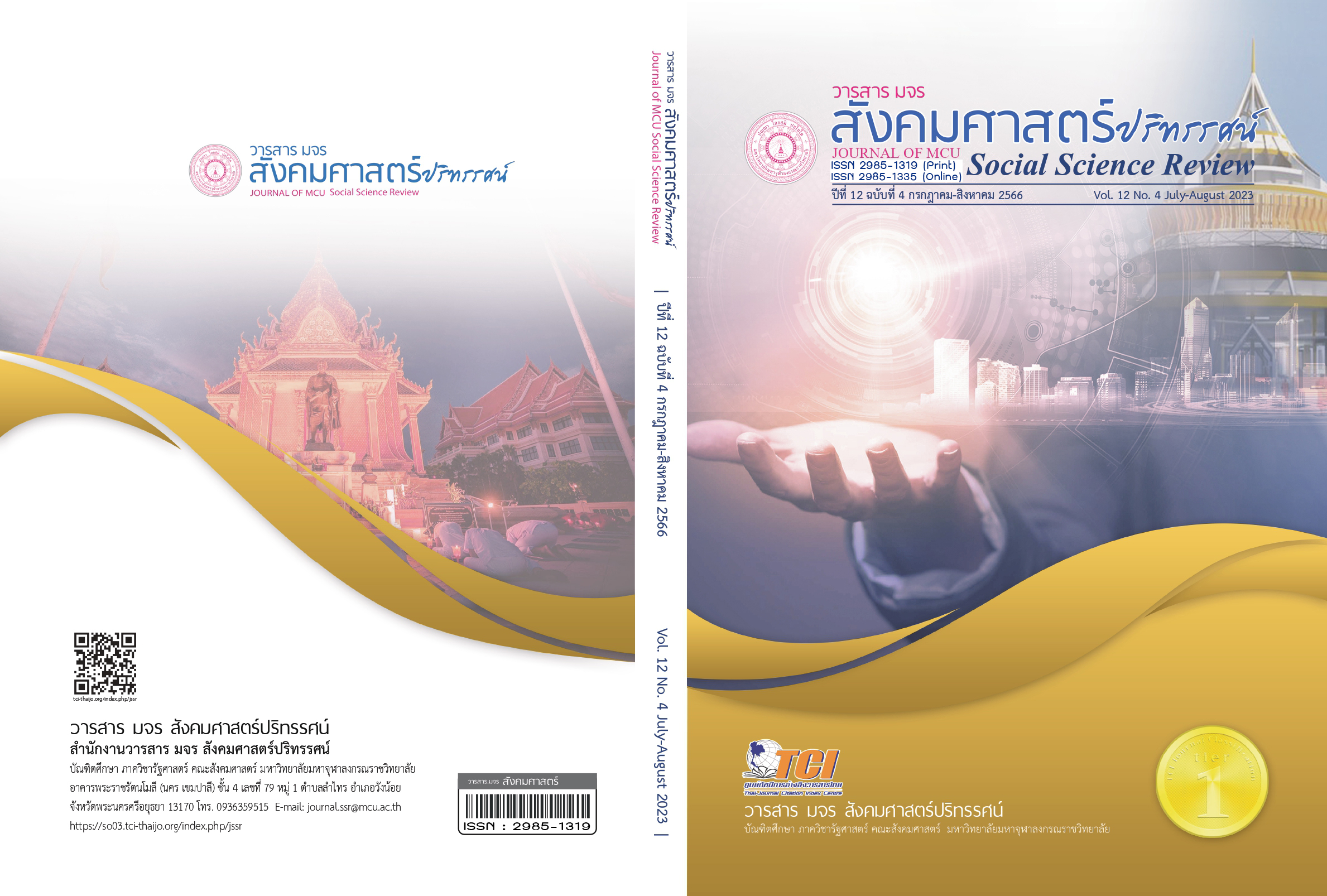การบูรณาการหลักพุทธธรรมในการบริหารจัดการโดยใช้ระบบเศรษฐกิจหมุนเวียน เพื่อการพัฒนาที่ยั่งยืนของบริษัทมหาชนในตลาดหลักทรัพย์แห่งประเทศไทย
คำสำคัญ:
การบูรณาการ, อิทธิบาท 4, การบริหาร, ระบบเศรษฐกิจหมุนเวียนบทคัดย่อ
บทความวิจัยนี้มีวัตถุประสงค์เพื่อ 1. ศึกษาการบริหารจัดการระบบเศรษฐกิจหมุนเวียน 2. ศึกษาปัจจัยที่ส่งผลต่อการบริหารจัดการระบบเศรษฐกิจหมุนเวียน และ 3. นำเสนอแนวทางการบูรณาการหลักพุทธธรรมในการบริหารจัดการโดยใช้ระบบเศรษฐกิจหมุนเวียนเพื่อการพัฒนาที่ยั่งยืนของบริษัทมหาชนในตลาดหลักทรัพย์แห่งประเทศไทย เป็นการวิจัยแบบผสานวิธี การวิจัยเชิงปริมาณใช้แบบสอบถาม เก็บข้อมูลจากกลุ่มตัวอย่าง จำนวน 284 ตัวอย่าง วิเคราะห์ข้อมูลโดยใช้สถิติ คือ การวิเคราะห์การถดถอยพหุคูณ และการวิจัยเชิงคุณภาพ ใช้วิธีการสัมภาษณ์เชิงลึกกับผู้ให้ข้อมูลสำคัญ จำนวน 19 รูปหรือคน ใช้วิธีการสุ่มแบบเจาะจง วิเคราะห์ข้อมูลเนื้อหาเชิงพรรณนา และการสนทนากลุ่มเฉพาะจำนวน 9 คน เพื่อยืนยันโมเดลจากการสังเคราะห์
ผลการวิจัยพบว่า 1.การบริหารจัดการโดยใช้ระบบเศรษฐกิจหมุนเวียนเพื่อการพัฒนาที่ยั่งยืน โดยรวมเฉลี่ยอยู่ในระดับปานกลาง รายด้านโดยเฉลี่ยอยู่ในระดับมาก คือ ด้านการเลือกใช้วัสดุทางเทคนิค และ ด้านนวัตกรรมและเทคโนโลยีสำหรับกระบวนการผลิต 2. ปัจจัยที่ส่งผลต่อการบริหารจัดการ พบว่า กระบวนการบริหาร ด้านการปรับปรุงแก้ไข ด้านการปฏิบัติการตามแผน และ ด้านการตรวจสอบ ส่งผลต่อการบริหารจัดการโดยใช้ระบบเศรษฐกิจหมุนเวียนที่ระดับนัยสำคัญทางสถิติ 0.01 ซึ่งทั้ง 3 ปัจจัยสามารถร่วมอธิบายความผันแปรของการบริหารจัดการ ได้ร้อยละ 60.43 และ การปฏิบัติตามหลักอิทธิบาท 4 ด้านฉันทะ-รักงาน และ ด้านวิมังสา-ทำงานด้วยปัญญา ส่งผลต่อการบริหารจัดการโดยใช้ระบบเศรษฐกิจหมุนเวียน ที่ระดับนัยสำคัญทางสถิติ 0.01 ซึ่งทั้ง 2 ปัจจัยสามารถร่วมกันอธิบายความผันแปรของระบบเศรษฐกิจหมุนเวียน ได้ร้อยละ 41.5 3. การบูรณาการหลักพุทธธรรมในการบริหารจัดการ กระบวนการบริหารประกอบด้วย 4 หลักการ คือ วางแผนดี มีการกระทำ นำตรวจสอบ และ ตอบโจทย์ทุกคน และ บูรณาการด้วยการปฏิบัติตามหลักธรรม คือ การปฏิบัติตามหลักอิทธิบาท 4 ประกอบด้วย 4 หลักการ คือ ชวนศรัทธา พาพากเพียร เรียนรู้อย่างยั่งยืน และ ฟื้นทบทวน นำไปสู่การบริหารจัดการ ประกอบด้วย 4 หลักการ คือ คัดสรรวัสดุ มุ่งออกแบบผลิตภัณฑ์ ผลักดันนวัตกรรม นำมาตรฐานมา สามารถดำรงระบบเศรษฐกิจหมุนเวียนในองค์กรได้อย่างยืนยาว และมีความสมดุลระหว่างกำไรขององค์กร พนักงานเข้าใจ และดูแลสิ่งแวดล้อม
เอกสารอ้างอิง
เกรียงไกร ทรัพย์แสนมา และสิริลภัสลดา ปันสาน. (2562). รูปแบบการพัฒนาสินค้าเกษตรของบริษัทประชารัฐรักสามัคคีวิสาหกิจเพื่อสังคม (ประเทศไทย) จำกัด. วารสารการบริหารการปกครองและนวัตกรรมท้องถิ่น มหาวิทยาลัยราชภัฏสุรินทร์, 3(2), 67-76.
ดรุณี มูเก็ม. (2564). อิทธิพลแนวคิดเศรษฐกิจหมุนเวียนที่มีต่อพฤติกรรมการใช้บรรจุภัณฑ์อาหารและเครื่องดื่มแบบยั่งยืนของผู้บริโภคจังหวัดภูเก็ต. วารสารมนุษยศาสตร์และสังคมศาสตร์ มหาวิทยาลัยราชพฤกษ, 15(12), 113-128.
ปฐมพงษ์ ณ ตะกั่วทุ่ง และคณะ. (2564). วัสดุจากเส้นใยปาล์มน้ำมันเพื่อการออกแบบผลิตภัณฑ์. วารสารครุศาสตร์อุตสาหกรรม, 14(2), 612-621.
พระครูสุชัยพัชรมงคล (วิษณุ ตปสมฺปนฺโน). (2564). การพัฒนาศักยภาพของเยาวชนในจังหวัดเพชรบูรณ์ด้วยหลักพุทธธรรม (ดุษฎีนิพนธ์ปรัชญาดุษฎีบัณฑิต สาขาวิชารัฐประศาสนศาสตร์). พระนครศรีอยุธยา: มหาวิทยาลัยมหาจุฬาลงกรณราชวิทยาลัย.
ศิริรัตน์ สังข์สุวรรณ. (2563). แนวทางการพัฒนาโรงไฟฟ้าชุมชนจากขยะเพื่อความมั่นคงด้านพลังงานอย่างยั่งยืน. วารสาร มจร สังคมศาสตร์ปริทรรศน์, 9(3), 118-132.
สาโรจน์ ดำรงศีล. (2559). การใช้แผ่นยางแทนกำมะถันเคลือบผิวในการทดสอบกำลังอัดคอนกรีต. วารสารวิชาการและวิจัย มหาวิทยาลัยเทคโนโลยีราชมงคลพระนคร, 10(1), 107-113.
อภิวัฒน์ จ่าตา. (2562). การบริหารจัดการของรัฐในการส่งเสริมกัญชาเสรีเพื่อการแพทย์ทางเลือกของไทย (ดุษฎีนิพนธ์ปริญญาปรัชญาดุษฎีบัณฑิต สาขาวิชารัฐประศาสนศาสตร์). พระนครศรีอยุธยา: มหาวิทยาลัยมหาจุฬาลงกรณราชวิทยาลัย.
อุตสาหกรรมสิ่งทอและเครื่องนุ่งห่ม เครื่องหนังและรองเท้า อัญมณีและเครื่องประดับ. (2562). โครงการศูนย์สารสนเทศอัจฉริยะอุตสาหกรรมแฟชั่น ปี 2562. สืบค้น 11 สิงหาคม 2564, จากhttps://www.thaitextile.org/th/insign/downloadcmssrc
Ellen Macarthur Foundation & Antea Group. (2564). Circular Economy คืออะไร สำคัญอย่างไรต่อโลกของเรา. สืบค้น 25 มกราคม2564, จาก https://home.maefahluang.org/1725
ดาวน์โหลด
เผยแพร่แล้ว
รูปแบบการอ้างอิง
ฉบับ
ประเภทบทความ
สัญญาอนุญาต
ลิขสิทธิ์ (c) 2023 วารสาร มจร สังคมศาสตร์ปริทรรศน์

อนุญาตภายใต้เงื่อนไข Creative Commons Attribution-NonCommercial-NoDerivatives 4.0 International License.
เพื่อให้เป็นไปตามกฎหมายลิขสิทธิ์ ผู้นิพนธ์ทุกท่านต้องลงลายมือชื่อในแบบฟอร์มใบมอบลิขสิทธิ์บทความให้แก่วารสารฯ พร้อมกับบทความต้นฉบับที่ได้แก้ไขครั้งสุดท้าย นอกจากนี้ ผู้นิพนธ์ทุกท่านต้องยืนยันว่าบทความต้นฉบับที่ส่งมาตีพิมพ์นั้น ได้ส่งมาตีพิมพ์เฉพาะในวารสาร มจร สังคมศาสตร์ปริทรรศน์ เพียงแห่งเดียวเท่านั้น หากมีการใช้ภาพหรือตารางหรือเนื้อหาอื่นๆ ของผู้นิพนธ์อื่นที่ปรากฏในสิ่งตีพิมพ์อื่นมาแล้ว ผู้นิพนธ์ต้องขออนุญาตเจ้าของลิขสิทธิ์ก่อน พร้อมทั้งแสดงหนังสือที่ได้รับการยินยอมต่อบรรณาธิการ ก่อนที่บทความจะได้รับการตีพิมพ์ หากไม่เป็นไปตามข้อกำหนดเบื้องต้น ทางวารสารจะถอดบทความของท่านออกโดยไม่มีข้อยกเว้นใดๆ ทั้งสิ้น





